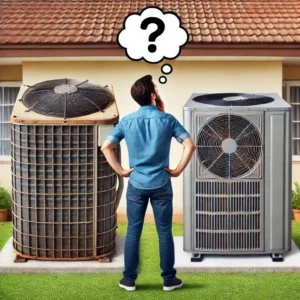When to Repair or Replace AC: Key Signs to Watch For
Is your air conditioner struggling to keep your home cool? Knowing when to repair or replace your AC can save you money and ensure your home stays comfortable year-round. In this post, we’ll guide you through the essential factors to consider, helping you make an informed decision that best suits your needs.
Why the Repair/Replace Decision Matters
Choosing whether to repair or replace your AC is more than just a financial decision—it’s about maintaining the comfort and efficiency of your home. An outdated or inefficient Air Conditioning unit can lead to higher energy bills, frequent breakdowns, and an overall decline in your home’s comfort. By understanding the key factors involved, you can make a decision that keeps your home comfortable and your budget intact.
When to Repair Your AC
Minor Issues
If your AC is experiencing minor issues like clogged filters, a refrigerant leak, or minor electrical problems, repairing it might be the best option. These issues are typically fixable at a reasonable cost, especially if your system’s parts are under warranty.
Recent Installation
If your air conditioner was installed within the last few years, it’s often more cost-effective to repair rather than replace. Most AC units are designed to last between 10-15 years, so a newer unit may just need a quick fix to get it running smoothly again.
Repair Cost vs. Replacement Cost
A good rule of thumb is to compare the repair cost to the cost of a new unit. If the repair costs are less than 50% of the price of a new air conditioner, a repair might be the better option. However, if repairs are frequent and expensive, it may be time to consider a replacement.
Parts Still Under Warranty
If your AC parts are still under warranty, repairs can be much more affordable. Warranties can cover significant repair costs, making it more economical to fix your existing unit.
When to Replace Your AC
Age of the Unit
Air conditioners typically last about 10-15 years. If your unit is approaching this age or older, it’s likely time to replace it. Older units become less efficient over time, leading to higher energy bills and reduced comfort in your home.
Frequent Breakdowns
Are you calling your HVAC technician more often than usual? Frequent repairs are a clear sign that your AC is on its last legs. Instead of continuing to pour money into an old, unreliable unit, investing in a new system might save you more in the long run.
Poor Energy Efficiency
If your energy bills are climbing and your home isn’t as cool as it used to be, your AC’s efficiency may be declining. Newer models are designed to be far more energy-efficient, saving you money on your utility bills and reducing your carbon footprint.
Parts No Longer Under Warranty
When the warranty on parts has expired, repair costs can skyrocket. Without a warranty, you might end up spending more on repairs than what a new unit would cost. In these cases, replacing the AC is often the more financially sound choice.
Comfort and Performance Issues
If your AC is struggling to keep your home cool, resulting in uneven temperatures or high humidity levels, it may be time for a replacement. A new unit can provide consistent comfort and improved indoor air quality.
Take the Next Step: Professional AC Evaluation
Deciding whether to repair or replace your AC is a significant decision. To ensure you’re making the right choice, we recommend scheduling a professional evaluation of your system. A trusted HVAC technician can assess your unit’s condition and provide expert advice on the best course of action.
Remember, replacing an old, inefficient AC unit with a newer model can offer long-term savings, improved comfort, and peace of mind. Don’t hesitate to reach out for a consultation. Our experienced team is here to help you make the best decision for your home.
We hope this guide has been helpful in determining when to repair or replace your AC. If you have any questions or need further assistance, feel free to leave a comment below. And if you found this article useful, please share it with someone who might benefit from this information!

